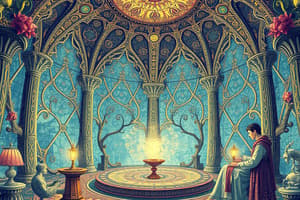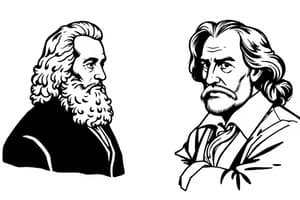Podcast
Questions and Answers
What estate are all men naturally in?
What estate are all men naturally in?
A state of perfect freedom to order their actions.
What is a state of equality?
What is a state of equality?
A state of equality is where all the power and jurisdiction is reciprocal, no one having more than another.
What does Locke say about people born of the same species or rank?
What does Locke say about people born of the same species or rank?
These people should be equal amongst another, without subordination or subjection.
What can happen if someone does harm?
What can happen if someone does harm?
Why must someone who does harm look to suffer?
Why must someone who does harm look to suffer?
What does Locke note about a state of liberty?
What does Locke note about a state of liberty?
What is the law of nature?
What is the law of nature?
Why is the reasoning behind the law of nature according to Locke?
Why is the reasoning behind the law of nature according to Locke?
What will the law of nature achieve?
What will the law of nature achieve?
What happens to transgressors?
What happens to transgressors?
To what extent should a criminal be punished?
To what extent should a criminal be punished?
Why does Locke say people can't be their own judge?
Why does Locke say people can't be their own judge?
What is the remedy rather than having people be their own judges?
What is the remedy rather than having people be their own judges?
When are men no longer in a state of nature?
When are men no longer in a state of nature?
What is a state of war?
What is a state of war?
How is a state of war declared?
How is a state of war declared?
What is the manner of war?
What is the manner of war?
What does the fundamental law of nature suggest in a state of war?
What does the fundamental law of nature suggest in a state of war?
What is the difference between state of war and state of nature?
What is the difference between state of war and state of nature?
What is a man's natural liberty?
What is a man's natural liberty?
Study Notes
State of Nature
- Men exist in a state of perfect freedom to order their own actions.
- A state of equality allows for reciprocal power and jurisdiction, ensuring no one dominates another.
- Individuals born of the same species/rank should possess equal advantages and should not be subject to subordination.
Consequences of Harm
- If an individual inflicts harm, they are subject to suffering or punishment.
- The imbalance of love shown to one person compared to the harm done justifies the need for punishment.
Liberty and Law of Nature
- The state of liberty does not equate to a state of license; individuals cannot dispose of possessions or people without restraint.
- The law of nature dictates that one must not harm another's life, health, liberty, or possessions.
- This law seeks to ensure peace and the preservation of mankind.
Punishment and Justice
- Transgressors of natural law face punishment.
- Punishment should be proportionate to the offense, based on reason and conscience.
- Individuals cannot act as their own judges due to inherent biases and tendencies for revenge, which may lead to excessive punishments.
Role of Government
- Civil government serves as a remedy to the issues arising from self-judgment and partiality.
- Individuals leave the state of nature upon consenting to join a political society.
State of War
- A state of war is characterized by enmity and destruction, declared through actions or words.
- War is defined as a settled and deliberate design among parties.
- The fundamental law of nature permits the destruction of threats to survival, favoring the preservation of the innocent.
Distinction Between States
- The state of nature embodies peace and goodwill, whereas the state of war represents mutual destruction.
Natural Liberty
- A man's natural liberty entails freedom from any superior power, except for the legislative authority established by a commonwealth.
Studying That Suits You
Use AI to generate personalized quizzes and flashcards to suit your learning preferences.
Description
This quiz covers key concepts from Chapters 1-4 of Locke's 'Two Treatises of Government.' Explore the ideas of the state of nature and equality as articulated by Locke. Perfect for students looking to deepen their understanding of political philosophy.




